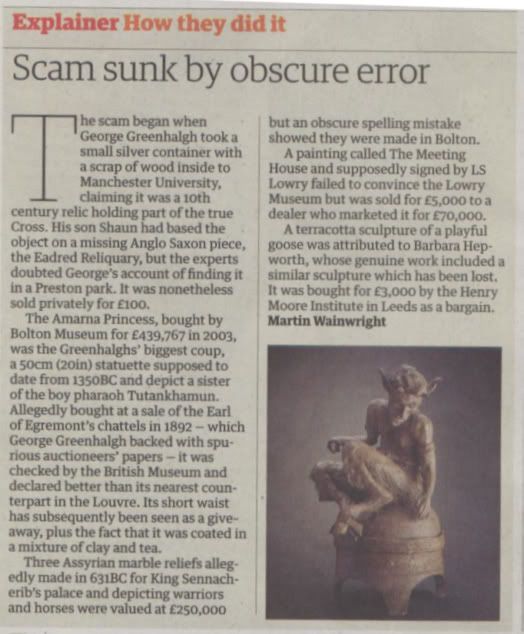
 |
|
|
|
|
#1 |
|
Member
Join Date: Jan 2007
Location: Netherlands
Posts: 23
|
Sorry somehow my massage has gone.
Question was how to determine if a sword or keris is an antique or recent well made piece. Last edited by hoorn178; 9th January 2008 at 05:40 PM. Reason: Genuine or fake? |
|
|

|
|
|
#2 | |
|
(deceased)
Join Date: Dec 2004
Location: East Coast USA
Posts: 3,191
|
Quote:
Hi Bart We need to clarify "FAKE". If a seller is trying to pass of a newly made sword or keris that was made in the tradition way than it would be considered a faked Antique. If one creates a new piece in the traditional manner and it is stated so I think I would consider it a reproduction. There are still swords such as katana,dah and keris that are being produced today by highly skilled artisans that I would not consider being fake. If your question is how do I tell the difference between truly well made antique and a modern tradition piece than we can make some comparisons to show you what to look for. Lew |
|
|
|

|
|
|
#3 |
|
Member
Join Date: Jan 2007
Location: Netherlands
Posts: 23
|
Thanks Lew,
I understand what you mean. I have seen many blades now the past years but I still find it difficult to see if it is an antique. Your comparisons would be helpfull Cheers, Bart. |
|
|

|
|
|
#4 |
|
Member
Join Date: May 2006
Posts: 6,892
|
Experience Bart.
Lots and lots and lots of experience. In the field of keris I have over 50 years worth of experience. I have been taught by the best and most knowledgeable people in this field. I can still make mistakes. I have seen errors made by the man who is perhaps the foremost connoisseur of Javanese art and the keris. The whole experience of weapons study and collecting is an ongoing exercise in learning. It never stops. |
|
|

|
|
|
#5 |
|
Member
Join Date: Dec 2004
Location: comfortably at home, USA
Posts: 432
|
I must concur with these folks observations. I've studied and collected
Japanese swords for nearly 30 years and have had the chance to study and learn from many of the most knowledge folks in the field. Even the Japanese experts will at times disagree as to the age, maker or school of a sword. Lord knows I've made more than my share of screwups. The entry of the Chinese fakers (some of which are EXTREMELY good) complicates matters even more. I must get and see a dozen messages a week from "newbies" (no offense intended in that term) who have been taken and bought "genuine antique Japanese swords" that were just plain Chinese fakes. What really hurts is that the fakers not only defraud and injure the buyer, but the whole collecting community as well. Many times a newbie, once burned, will never look at another katana. Thus a potential collector, student of the sword, is lost forever. I'm sure it's the same with most all fields of antiques. All one can do is study, see as many good examples as possible and listen to that little voice in the back of your head. When it says too good to be true - it is. Rich S The Japanese Sword Index http://www.geocities.com/alchemyst/nihonto.htm |
|
|

|
|
|
#6 |
|
Member
Join Date: Jul 2005
Location: Toronto, Canada
Posts: 1,242
|
The first keris I got was a piece of garbage. It looked like a gilded naga blade and I thought "man it must be my luck to stumble on this and all other collectors missed it" I was very sorely surprised when I got a piece of rusted, painted copper. So I showed it to folks here and one fine gentleman took the time to show me good keris and teach me about them. So I will echo what has been already said, look at good examples, talk to those who know about the blades you want, and read a LOT. Buy some decent old and new pieces with guidance from those more knowledgeable and learn to distinguish the important features that sets them apart.
Regards, Emanuel |
|
|

|
|
|
#7 |
|
Member
Join Date: Oct 2007
Posts: 1,597
|
You really have to handle an item to be as sure as you can be that it is correct and even then the best can still be taken in, but items that have been made to actually be used as a tool and not just looked at or hung on a wall e.g. swords, daggers etc., have a different feel about them no matter which part of the world they come from. I do occasionally buy weaponry from e-bay but never pay any more than can be written off as an affordable mistake, except once and only after communicating with the seller a number of times and requesting more detailed photographs, and this affordable amount obviously varies from person to person. Buyer Beware is an old and oft quoted saying but still true nonetheless.
Regards, Norman. |
|
|

|
|
|
#8 |
|
Member
Join Date: Dec 2004
Location: What is still UK
Posts: 5,807
|
In a tooth and claw open market why are these people being strung up. Just because you are rich and buy a fake or dud why should you be protected by the law? They made this stuff in there garden shed??? All that bollocks education and posh art market nonesence leveled by a couple of rough necks.
 
|
|
|

|
|
|
#9 |
|
Member
Join Date: May 2006
Posts: 6,892
|
Tim, I was not writing of myself, but a very famous fellow who is now a Javanese Prince and has been a directive force in Indonesian society since the days of Sukarno. A very, very important, knowledgeable and influential man. Not a nonentity like myself.
But yes, I have made errors. These days, very, very few, in fact, I cannot recall any recent material errors at all, but going back 40 years and more I made quite a few. In light of my knowledge at that time, none were avoidable, I only had experience in the keris in the Australian environment until I was well into my twenties,and this was not enough back prior to the increased flow of information generated by the internet and all the new publications. I have always thought of these errors, and the costs involved in learning about the keris, as education expenses. How much does a degree cost ? How much does it cost to put a kid through primary school? All education costs money. You pay the tuition costs and move on. If I add up what it has cost me to learn about keris, I could probably have paid for several post graduate degrees. At least. But the bottom line is that I can still make a mistake. This realisation is probably the most important single thing I have learnt. |
|
|

|
|
|
#10 | |
|
Member
Join Date: Aug 2007
Location: CHRISTCHURCH NEW ZEALAND
Posts: 2,739
|
Quote:
I once had the misfortune of buying 5 Yemeni daggers in one lot off Ebay, only to find that when they arrived they were ALL fakes! The "silver" bands were actually tin, still stamped on the reverse side with the brand of product which they originally held! LUCKILY in this case I managed to extract a refund from the seller, BUT had I not, it is a very long way from NZ to Dubai to bang on someones door!! The buyer definately has to be really careful and if you can not obtain satisfactory answers from the seller, AND the pics are unclear, then no matter how cheap you think you are getting an item, it is better to leave it alone! DO NOT ALWAYS BELIEVE WHAT YOU READ AS AN ITEM DESCRIPTION. IT IS HUMAN NATURE TO EMBELISH DESCRIPTIONS TO EXTRACT HIGH PRICES! Stuart 
|
|
|
|

|
|
|
#11 |
|
Member
Join Date: Jan 2006
Posts: 14
|
p
|
|
|

|
|
|
#12 |
|
Member
Join Date: Dec 2004
Location: Ann Arbor, MI
Posts: 5,503
|
No matter how smart, experienced and careful we are, there will always be a forger able to fool us.
Collecting is a passion, and reason is always put on a back burner when passion is concerned ( divorce lawyers make a very nice living  ). ).We always dream about finding a "sleeper", and these happen just often enough to whet our appetites for yet another adventure . No pain, no gain. I once got in a frantic e-bay negotiation with some guy selling a seemingly ugly kindjal. Got it for a sum that made him exceedingly happy. Well, it is mine, and it is something that rightfully belongs in the main collection of the Hermitage. Of course, my next adventure was less successful, to put it mildly  What are the main reasons for our failures? - Smart seller/good forger/just a criminal ( as we speak, one very successful e-bayer fell victim to a sting; I'll post details a bit later) - Greed ( yup, we are only humans...) - Careless abandon of reason ( ditto) - Self-indulgence ( " I am miserable and need a candy" Education and self-restraint are very important in preventing most of stupid mistakes, but a risk-averse collector will end up with a bunch of boring, run-of-the-mill and cheap things. After all, people who once actually wielded the very same swords we are currently buying took infinitely greater risks. Addendum: as promised, here are the details: http://cgi.ebay.com/ws/eBayISAPI.dll...MEWA:IT&ih=006 About year and a half ago, there was a similar "collection" of unbelievably good Ottoman and Indian swords offered by a seller from the Ukraine. He re-listed each sword ~1 week after sale (enough time for bank transfer), and sold each one 3 times! Needless to say, he got negative feedbacks from his "marks". Currently, he also has a great shamshir for sale, private auction. The seller's names used were all inactive for several years and had very good feedbacks. Who is willing to bet that the buyer of this Tulwar is going to get it in the mail? And, of course, e-bay made it impossible to contact the buyer and warn him. Last edited by ariel; 19th January 2008 at 11:22 PM. |
|
|

|
 |
|
|